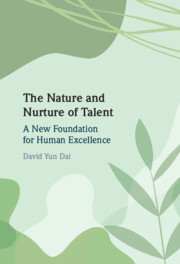Book contents
- The Nature and Nurture of Talent
- The Nature and Nurture of Talent
- Copyright page
- Dedication
- Contents
- Illustrations
- Foreword
- Acknowledgments
- Introduction Rationale, Goals, and Overview of the Book
- Chapter 1 The Evolving Complexity Theory of Talent Development
- Chapter 2 The Question of What Develops
- Chapter 3 The Question of How Talent Develops
- Chapter 4 The Question of When Critical Events Should Take Place
- Chapter 5 The Question of Where
- Chapter 6 How ECT Explains Various Talent Achievements
- Chapter 7 ECT in a Broader Landscape of Theoretic Models
- Chapter 8 Implications of ECT for Talent Identification and Assessment of Developmental Progressions
- Chapter 9 Implications of ECT for Promoting Human Excellence
- Chapter 10 Implications of ECT for Research Methodology
- Epilogue Is AI a Threat to Human Excellence?
- Postscript
- Glossary
- References
- Index
Chapter 4 - The Question of When Critical Events Should Take Place
Developmental Windows and Progressions in Talent Development
Published online by Cambridge University Press: 20 June 2024
- The Nature and Nurture of Talent
- The Nature and Nurture of Talent
- Copyright page
- Dedication
- Contents
- Illustrations
- Foreword
- Acknowledgments
- Introduction Rationale, Goals, and Overview of the Book
- Chapter 1 The Evolving Complexity Theory of Talent Development
- Chapter 2 The Question of What Develops
- Chapter 3 The Question of How Talent Develops
- Chapter 4 The Question of When Critical Events Should Take Place
- Chapter 5 The Question of Where
- Chapter 6 How ECT Explains Various Talent Achievements
- Chapter 7 ECT in a Broader Landscape of Theoretic Models
- Chapter 8 Implications of ECT for Talent Identification and Assessment of Developmental Progressions
- Chapter 9 Implications of ECT for Promoting Human Excellence
- Chapter 10 Implications of ECT for Research Methodology
- Epilogue Is AI a Threat to Human Excellence?
- Postscript
- Glossary
- References
- Index
Summary
Chapter 4 addresses the question of when certain events of TD have to take place for a viable line of the pursuit of excellence. ECT views the life cycle of a person as significantly constraining the timing of developmental events and processes for achieving any long-term goals. When human excellence is concerned, social conventions and cultural provisions further constrain what should be done and when it needs to be done. In other words, developmental corridors can be opened and closed at specific developmental junctures, prompting individuals to pick the best timing for engagement in specific endeavors that might have a better chance of success. Based on research evidence, ECT postulated two main concepts: developmental windows, which vary from domain to domain, closing certain developmental corridors (e.g., to become a musician) but opening others (e.g., to become a biologist) for the exploratory stage, and developmental progressions, which stipulate a temporal sequence of milestone events and critical transitions that have to take place to sustain TD. Finally, distinct Matthew effects, the cumulative advantage prevalent in TD, are explained over this TD course in terms of accelerated development as well as individual strengths, social recognition, and privileged access to opportunities and resources.
Keywords
- Type
- Chapter
- Information
- The Nature and Nurture of TalentA New Foundation for Human Excellence, pp. 83 - 103Publisher: Cambridge University PressPrint publication year: 2024

